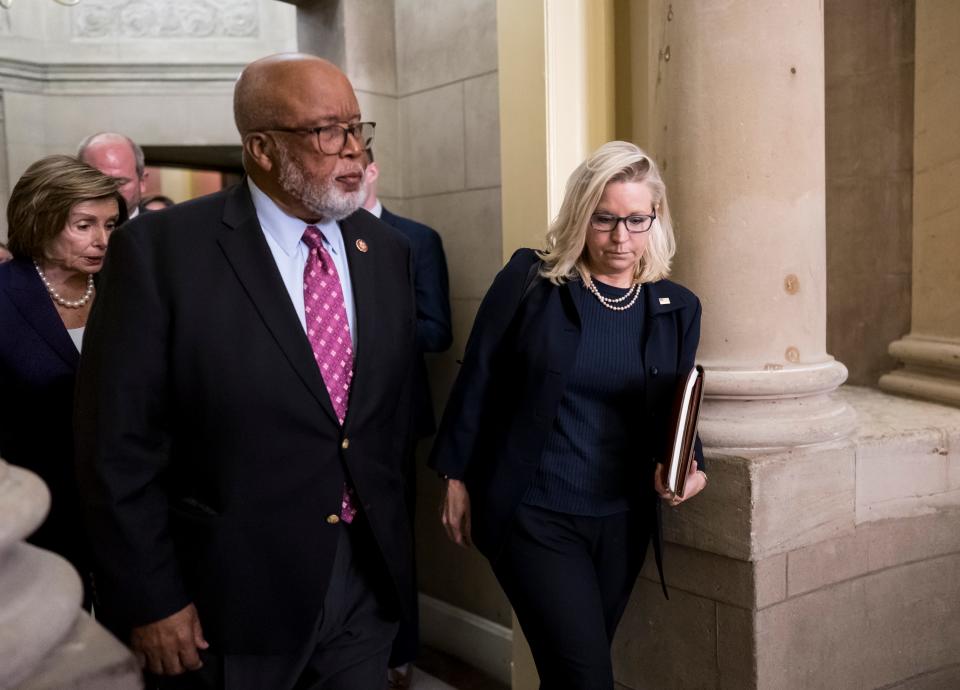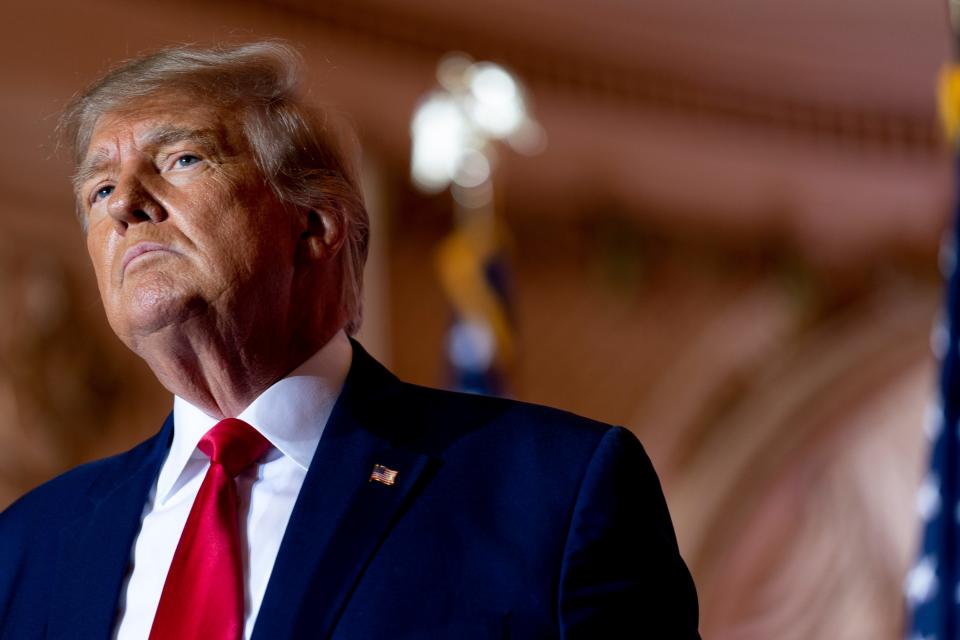Jan. 6 committee's Monday decision on Trump key to public legacy and Justice investigation
- Oops!Something went wrong.Please try again later.
- Oops!Something went wrong.Please try again later.
WASHINGTON – The special House committee examining the U.S. Capitol attack has had its share of signature moments during an 18-month inquiry that has featured riveting testimony from former top Trump administration officials, police officers and a rioter across nine televised public hearings this year.
On Monday, the bipartisan panel is set to take its most defining actions when lawmakers vote on whether key figures in the inquiry should be referred to the Justice Department for criminal prosecution, including Donald Trump.
Federal prosecutors already are leading two criminal investigations that could directly implicate the former president who sought to overturn the 2020 election after he lost.
Yet the committee's final act, while not binding on Justice, is expected to render a long-awaited verdict of its own on the conduct of Trump and a constellation of former advisers and allies who sought to deny President Joe Biden's election.
What to know about Monday's final Jan. 6 committee hearing: Next Jan. 6 committee hearing is Monday: Panel to vote on criminal recommendations

While the actions would mark a landmark coda for the panel's work, legal analysts said the signal the committee sends to the general public will be equally, if not more important.
"The message I believe the committee will want to send to the public at large is that many individuals, including the handful of those it refers for criminal prosecution by the Justice Department, must be held accountable publicly for their treacherous betrayal of the United States and for their inexcusable involvement in seeking for the first time in our history to prevent a peaceful transfer of power to the winner of our national presidential election," said Laurence Tribe, professor emeritus at Harvard Law School.
What we learned from every hearing this year: The next Jan. 6 hearing is Monday: What we learned from all 9 hearings this year
Targets abound
There is no shortage of possible targets for committee action, Trump chief among them.
Committee members, notably Chairman Bennie Thompson, D-Miss., along with Reps. Liz Cheney R-Wyo., the panel's vice chairperson, and Adam Kinzinger, R-Ill., have openly blamed Trump for inciting the deadly insurrection and leading the campaign to subvert the election.
“Donald Trump orchestrated a scheme to overturn a presidential election and block the transfer of power," Thompson and Cheney said in a joint statement last month, after Trump had defied a subpoena to appear before the panel.
Others who have drawn the committee's focus during the series of hearings include:
Rudy Giuliani, one of the primary faces of the failed legal effort who repeatedly raised baseless allegations of fraud to challenge Biden's election.
John Eastman, another Trump lawyer who helped coordinate a strategy to recruit alternate slates of electors in key battleground states Biden won.
Mark Meadows, Trump's former chief of staff who repeatedly pressed Justice officials to investigate unfounded claims of election fraud.
Meadows also helped organize a Jan. 2, 2021 telephone call in which Trump pressured Georgia Secretary of State Brad Raffensperger to flip the state's election results in favor of the former president.
What Trump did during those 187 minutes he was out of sight: A breakdown of the 187 minutes Trump was out of view on Jan. 6 as aides urged him to act

While the Justice Department is not obligated to pursue any criminal referrals the committee may make, analysts said the panel's action is, nonetheless, important and necessary.
"The actions the committee takes have to be decisive, based on the absolute truth and must be unimpeachable," said David Jolly, a former Republican congressman from Florida. "If not, they will be very quickly swept up into an alternative political narrative... The findings have be absolutely clear."
Jolly said the committee would likely be well served to review the disputed 2019 rollout of the report on Russia's interference in the 2016 election delivered by then-Justice special counsel Robert Mueller.
While the report contained damning accounts of Trump's efforts to obstruct the investigation, it left any decision to pursue a criminal prosecution to then-Attorney General William Barr.
Barr, along with then-Deputy Attorney General Rod Rosenstein, quickly concluded that Trump's conduct was not criminal, prompting Trump to claim "complete and total exoneration."
"They have to name names and make referrals," Jolly said.
Mueller report outcome: Mueller’s report found no Russia collusion, but vindication remains elusive for Trump
Connecting the dots
For the Justice Department, the value of the committee's actions, will be found beyond the likely referrals to include witness transcripts, supporting documents and other evidence gathered congressional investigators during the course of the inquiry.
Attorney General Merrick Garland said last month that federal prosecutors want access to all of the committee's evidence.
The Justice investigations related to Trump are now being led by special counsel Jack Smith.

Garland's appointment of a special counsel appeared to contain the suggestion that the ongoing inquiries – examinations into "whether any person or entity unlawfully interfered with the transfer of power" and the mishandling of government documents recovered at Trump's Mar-a-Lago estate in Florida – had reached inflection points.
Indeed, Smith's appointment was quickly followed by a flurry of subpoenas to local election officials in the key swing states where Trump and his aides sought to challenge election results based on unsubstantiated allegations of fraud.
Merrick Garland's challenge: Ensuring DOJ's independence as special counsel takes up Trump inquiries
"The (committee's) information could rapidly accelerate Justice's work and connect the dots," Jolly said.
Harry Litman, a former deputy assistant attorney general during the Clinton administration, said Justice will have to make "an independent judgment" on whatever the committee decides, though he lauded the panel's work.
"By most accounts, this was one of the most expert and well focused set of hearings in congressional history," Litman said. "They did a really good job of taking what they could get and leaving behind what they couldn't."
This article originally appeared on USA TODAY: January 6 committee's Trump decision important to legacy, DOJ probe

